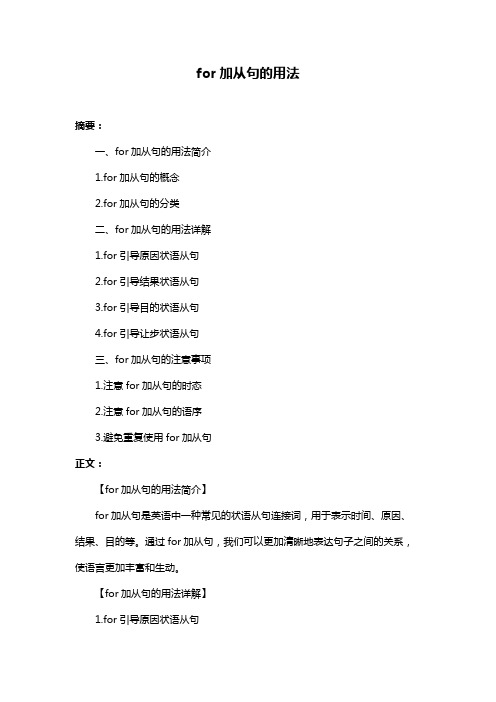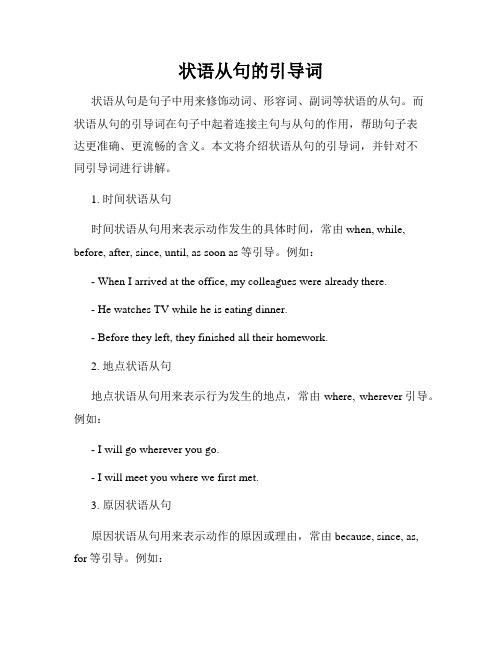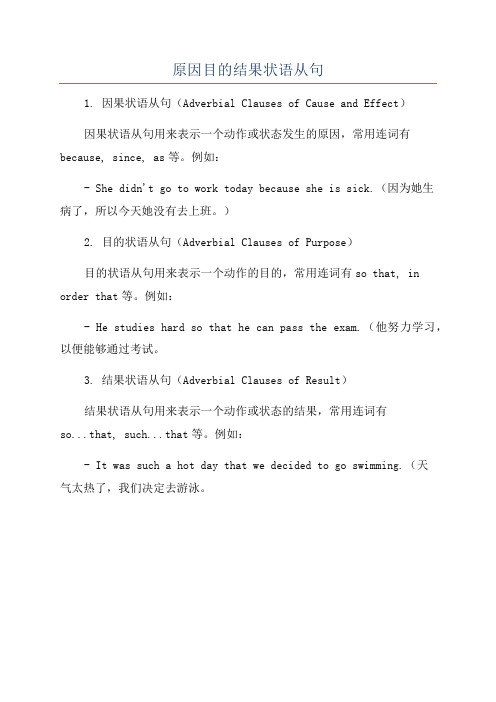原因结果目的状语从句
状语从句知识点详解(初中英语专项复习)14

状语从句知识点详解(初中英语专项复习)状语从句的概念: 用一个句子作状语来修饰动词和形容词,以表明动作发生或状态存在的时间、地点、原因等,这个句子就叫做状语从句。
状语从句的分类:状语从句共分为九大类,包括:时间、地点、原因、条件、让步、目的、结果、方式、比较状语从句。
下面分别讲解:一、时间状语从句概念:用来表示时间的状语从句,由when, while, as, till, until,before, after, since等引导。
由于时间状语从句的引导词所表示的意思并非一致,不同引导词表达不同的时间,它们在句子中对应的时态、语态等也有所不同。
例如:when /while引导的时间状语从句when引导的从句的谓语动词通常是瞬间动词,也可以是延续性动词。
从句动作可与主语动作通常先后发生也可同时发生。
I was writing when my sister came back.( come是瞬间动词,只能用when引导,不能用while)He often wrote me when/while he studied in Shanghai International Studies University.( study 是延续性动词,while可代替when)While my mother was cooking , I was playing chess with dad. (cook是延续性的动词,cook和play同时发生)I like playing chess while my sister likes reading stories.我喜欢下棋,而我姐姐喜欢看小说。
(while表示对比)when和while的区别还有:while引导的时间状语从句多用于进行时态,而when引导的时间状语从句多用于一般时态。
While we were playing games, our headmaster called me .我们正在做游戏的时候,校长叫我了。
for加从句的用法

for加从句的用法摘要:一、for加从句的用法简介1.for加从句的概念2.for加从句的分类二、for加从句的用法详解1.for引导原因状语从句2.for引导结果状语从句3.for引导目的状语从句4.for引导让步状语从句三、for加从句的注意事项1.注意for加从句的时态2.注意for加从句的语序3.避免重复使用for加从句正文:【for加从句的用法简介】for加从句是英语中一种常见的状语从句连接词,用于表示时间、原因、结果、目的等。
通过for加从句,我们可以更加清晰地表达句子之间的关系,使语言更加丰富和生动。
【for加从句的用法详解】1.for引导原因状语从句原因状语从句用于说明某件事情发生的原因。
在英语中,我们通常使用for加从句来引导原因状语从句。
例如:For he was rich, he didn"t care about money.(因为他富有,所以他不在乎钱。
)2.for引导结果状语从句结果状语从句用于说明某件事情发生的结果。
在英语中,我们通常使用for加从句来引导结果状语从句。
例如:For he was late, he missed the train.(因为他迟到,所以他错过了火车。
)3.for引导目的状语从句目的状语从句用于说明某件事情发生的目的是为了什么。
在英语中,我们通常使用for加从句来引导目的状语从句。
例如:For he worked hard, he passed the exam.(因为他努力学习,所以他通过了考试。
)4.for引导让步状语从句让步状语从句用于说明尽管有某种情况存在,但某件事情仍然发生。
在英语中,我们通常使用for加从句来引导让步状语从句。
例如:For he was tired, he still went on running.(尽管他累了,他还是继续跑步。
)【for加从句的注意事项】1.注意for加从句的时态在使用for加从句时,我们需要注意时态的一致性。
状语从句

7.比较状语从句 由than、as…as引导。如: Jim is taller than me. 吉姆比我高。 Lucy jumps as far as Lily. 露茜和莉莉跳得一样远。 8.方式状语从句 由as、as if等引导。如: Please do as I do. 请像我这样做。 She lay down as if she was ill. 她躺着似乎是病了。 9.让步状语从句。 通常由though、although、even if、Whatever等 引导。如: There is air around us, though we can't see it. 我们周围都是空气,尽管我们看不到。
Байду номын сангаас
(改错)
《中考指导》
中考考点2: if表 “是否”引导宾语从句可用将来时. C 考题:I don’t know if he __. If he __ , I’ll tell you. A. will come, will come B. comes, will come C. will come, comes D. comes, come 《中考指导》 中考考点3: “祈使句 + and (or)+ 陈述句” 在意思上相 当 于一个带有条件状语从句的复合句。
中考考点3:※※※while从句用进行时 were readinng e.g.1) My parents _______________ (read) some newspapers while I ____________ (play) with my e-dog this was playing time yesterday.《中考指导》 2) While we ____________ (travel) in were travelling Australia last year, I visited Lucy who once taught English in our school. (上海市2004)
原因、目的和结果状语从句

B.He has so little time that he can’t go to the cinema with you.
(11) 如果主从句的主语相同,并且从句是否定的形式, 可以用too...to...句型转化。 too+形容词/副词+to do
原因状语从句
原因状语从句:从句表示的是主句行为的原因。通 常由because, since, as, for引导。
(1) because表示直接原因(听话人所不知的),语气 最强,引导原因状语从句多放在主句之后。 回答由why提出的问题,只能用because。此外, because和so不能同用在一个句子里。
Speak clearly so that they may understand you. (目的状语从句)
Jack is badly ill so that he has to rest. (结果状语从句)
用于目的状语从句,还有:
so as to…(肯定结构) eg. He got up early so as to catch the early train.
(4) for表示所说的理由是一种补充说明,for引导的从句一 般不放在句子的开头。 如: I decided to stop and have lunch, for I was feeling quite hungry.
Eg: 1. I was late for class yesterday _b_e_c_a_u_s_e there was
例如: He was so excited that he couldn't go to sleep that night. = He was too excited to go to sleep that night.
状语从句的引导词

状语从句的引导词状语从句是句子中用来修饰动词、形容词、副词等状语的从句。
而状语从句的引导词在句子中起着连接主句与从句的作用,帮助句子表达更准确、更流畅的含义。
本文将介绍状语从句的引导词,并针对不同引导词进行讲解。
1. 时间状语从句时间状语从句用来表示动作发生的具体时间,常由when, while, before, after, since, until, as soon as等引导。
例如:- When I arrived at the office, my colleagues were already there.- He watches TV while he is eating dinner.- Before they left, they finished all their homework.2. 地点状语从句地点状语从句用来表示行为发生的地点,常由where, wherever引导。
例如:- I will go wherever you go.- I will meet you where we first met.3. 原因状语从句原因状语从句用来表示动作的原因或理由,常由because, since, as,for等引导。
例如:- He was late for work because his car broke down.- Since it is raining, we will stay inside.- I will study hard as I want to pass the exam.4. 目的状语从句目的状语从句用来表示动作的目的,常由in order that, so that引导。
例如:- I study hard so that I can get good grades.- I will buy some groceries in order that we can cook dinner.5. 结果状语从句结果状语从句用来表示一个动作的结果,常由so that, so...that, such...that, such...as等引导。
原因目的结果状语从句

原因目的结果状语从句
1. 因果状语从句(Adverbial Clauses of Cause and Effect)
因果状语从句用来表示一个动作或状态发生的原因,常用连词有because, since, as等。
例如:
- She didn't go to work today because she is sick.(因为她生
病了,所以今天她没有去上班。
)
2. 目的状语从句(Adverbial Clauses of Purpose)
目的状语从句用来表示一个动作的目的,常用连词有so that, in order that等。
例如:
- He studies hard so that he can pass the exam.(他努力学习,以便能够通过考试。
3. 结果状语从句(Adverbial Clauses of Result)
结果状语从句用来表示一个动作或状态的结果,常用连词有
so...that, such...that等。
例如:
- It was such a hot day that we decided to go swimming.(天
气太热了,我们决定去游泳。
八种状语从句
八种状语从句状语从句在句中作状语,修饰主句中的动词、形容词和副词等。
按其作用和意义可分为时间、原因、目的、结果、条件、让步、方式、比较八种。
下面对这八种从句的要点加以总结。
一、各类状语从句的引导词及易混词的区别。
1. 时间状语从句1) 引导词(1)表示“当……时候”:when, while, as, whenever(2)表示“一……就……”:as soon as(3)其它:after, before, since, until, by the timeWhenever he comes, he brings a friend. 他每次来都带个朋友。
I want to see him as soon as he arrives. 他一来我就要见他。
I went to bed after I finished my homework. 我做完家庭作业之后才睡觉。
2) 易混引导词when, while, as 的区别when既可指“时间点”,与瞬时动词连用,也可指“时间段”,与延续性动词连用(这时可与while互换)。
如:When he came in, his mother was cooking. 他进来时,他妈妈正在烧饭。
When(While)we were at school, we went to the library every day. 我们在校求学时,每天都到图书馆去。
while 只表示时间段,因此while从句的谓语动词要用延续性动词。
Please don' t talk so loud while others are talking. 别人在工作时,切勿大声讲话。
as 与when 用法相似,但着重强调主句动作与从句动作同时发生,有“随着……”或“一边……一边……”之意。
She sang as she went along. 她边走边唱。
As you get older, you get more knowledge.随着年龄的增长,你获得的知识就越多。
高考英语语法必考考点(12)状语从句(含解析)
2019年高考英语语法必考考点(12):状语从句含解析李仕才【考点解读】在复合句中,修饰主句或主句谓语的句子叫作状语从句。
状语从句可位于主句之前,也可位于主句之后。
状语从句可分为时间、地点、原因、结果、条件、方式、让步、比较和目的等九大类。
一、状语从句引导词列表从句类型从属连词时间状语从句as, after, before, once, since, till, until, when, whenever, while, as soon as地点状语从句where, wherever, anywhere, everywhere原因状语从句because, since, as, now (that), seeing that, considering that, in that 结果状语从句that, so that, so/such ...that ...目的状语从句so that, in order that, for fear that, in case, for the purpose that条件状语从句if, unless, as/so long as, on condition that, in case, provided that 比较状语从句than, as ...as, not so/as ...as方式状语从句as, as if/though, how让步状语从句though, although, even if/though, however, whatever, as, while【点睛】(1)上述有些连词除了能引导状语从句外,还可引导定语从句和名词性从句。
在使用的时候,要根据句子结构和句意来判别和区分不同的从句,正确使用引导词。
以where为例,试比较下列多种从句的区别。
You are to find it where you left it. (地点状语从句)Tell me the address where he lives. (定语从句,先行词为the address)I don’t know where he came from. (宾语从句)Where he has gone is not known yet. (主语从句)This place is where they once hid. (表语从句)(2)在两个分句间要有一个且只有一个连词,千万不能按汉语习惯。
初中英语 原因、目的和结果状语从句详解
注意
so that (in order that)引导的状语从 句可用 “to ” 或者“in order to ” 转 换成简单句
eg: -- He got up early so that (in order that ) he could get to school on time. -- He got up early in order to (to) get to school on time.
他早起以便能准时到校。
in order to + 短语 -- Mulan dressed like a man in order to join the army.
in order that + 从句 --Mulan dressed like a man in order that she could join the army. 为了能够参军,木兰装扮成男人的样子。
so that 与 so 的区别
so that 引导的目的状语从句中,含有表 示可能性( could, can, will, may…)的词语
-- He got up early so that he could get to school on time.
他早起以便能准时到校。 --You must speak louder so that you can be heard by all.
so 因此,结果
so 因此,结果
eg: -- He worked too hard, so he fell ill again. -- 他工作过于劳累,结果又病倒了。
Try
我们要坐的近一点,以便能听得更清 楚。
-- We’ll sit nearer, so we can hear much better.
九大状语从句的英文表达
九大状语从句的英文表达1. 时间状语从句 (Adverbial clause of time):- When he arrived, everyone was already there.- I will call you as soon as I finish my work.2. 地点状语从句 (Adverbial clause of place):- Wherever she goes, she always takes her camera.- I will meet you at the park where we used to play.3. 原因状语从句 (Adverbial clause of cause/reason):- Since it"s raining, we should stay indoors.- The game was canceled because of bad weather.4. 结果状语从句 (Adverbial clause of result):- The car broke down, so we had to call for a tow truck. - He studied really hard, therefore, he got excellent grades.5. 条件状语从句 (Adverbial clause of condition):- If it rains, we will have to cancel the picnic.- Unless you hurry, you will miss the train.6. 目的状语从句 (Adverbial clause of purpose):- I am studying hard so that I can get into a good university.- He took extra classes in order to improve his English speaking skills.7. 方式状语从句 (Adverbial clause of manner):- She wrote the letter as if she was in a hurry.- They danced like nobody was watching.8. 比较状语从句 (Adverbial clause of comparison):- She is taller than I am.- He runs faster than his brother.9. 消息状语从句 (Adverbial clause of reported speech): - He told me that he would be late for the meeting.- She said that she was feeling tired.。
- 1、下载文档前请自行甄别文档内容的完整性,平台不提供额外的编辑、内容补充、找答案等附加服务。
- 2、"仅部分预览"的文档,不可在线预览部分如存在完整性等问题,可反馈申请退款(可完整预览的文档不适用该条件!)。
- 3、如文档侵犯您的权益,请联系客服反馈,我们会尽快为您处理(人工客服工作时间:9:00-18:30)。
10 逻辑关系(Logical relations)(61) 原因和结果表原因的词:because, since, as, for, because of表结果的词:so一、原因状语从句(1)原因状语从句通常由because, since, as, for引导。
(2)because表示直接原因,语气最强。
回答由why提出的问题,只能用because。
此外,because和so不能同用在一个句子里。
eg:------Why were you late for school?------Because I got up late.since引导原因状语从句,相当于now that,意思是“因为……,既然……,鉴于……”。
eg:Since the rain has stopped,let’s go for a walk. 既然雨停了,我们出去散散步吧。
as和since语气较弱,一般用来表示明显的原因。
由as和since引导的原因状语从居多放在句首。
例如:As he has no car, he can’t get there easily.Sin ce we have no money, we can’t buy it.(3)for表示所说的理由是一种补充说明,for引导的从句一般不放在句子的开头。
如:I decided to stop and have lunch, for I was feeling quite hungry.练习: I was late for class yesterday _______ there was something wrong with my bike.He took off his coat _______ he felt hot.you can’t answer the question, I’ll ask someone else.________the bad weather, we missed the train.二、结果状语从句(1)结果状语从句由so…that, such…that, so that引导。
(2)在由so...that引导的结果状语从句其结构是: “...so + 形容词(副词)+ that + 从句”。
Eg. He was so glad that he couldn’t say a word.Liping runs so fast that we can’t catch up with him.在由such…that引导的结果状语从句其结构是: “...such +a / an + 形容词+名词+ that + 从句”。
eg:It was such a hot day that nobody wanted to do anything.He had such long arms that he could almost touch the ceiling.(天花板)有时so…that和such...that可以互换。
Eg : It was such a wonderful film that all of us wanted to see it again.=It was so wonderful a film that all of us wanted to see it again. (3)如果名词前由many, much, little, few等词修饰时,只能用so, 不用such。
eg:Soon there were so many deer that they ate up all the wild roses.He has so little time that he can’t go to the cinema with you.(4)如果主从句的主语相同,并且从句是否定的形式,可以用too...to...句型转化。
eg:He was so excited that he couldn't go to sleep that night.= He was too excited to go to sleep.(5)如果主从句的主语相同,但从句是肯定的形式,可以用adj.+ enough替换。
eg:He is so old that he could go to school.= He is old enough to go to school.他够大了,可以去上学。
练习: It is ___ hot in the room ___ we have to go out for a walk.It was a wonderful movie all of us wanted to see it again.There were little water in the bottle the bird couldn’t reach it.三、目的状语从句表目的的词组:so that, in order that, in order to, to(1)目的状语从句通常由 so that, in order that(为了,以便)引导。
eg:We started early so that we could catch the first train.We used the computer in order that we might save time.(2)so that可引导目的状语从句,此时可用to或in order to替换,将其改为简单句。
eg:He got up early so that he could get to school on time.=He got up early(in order) to get to school on time.练习: I hurried I wouldn't be late for class.We should go by bus ___ we can get there earlier.May I sit nearer I can see more clearly?(4) 补充:so as to…(肯定结构)eg. He got up early so as to catch the early train.so as not to…(否定结构)eg.He got up early so as not to miss the early train.to…eg. He got up early to catch the early train.in order that …eg. He got up early in order that he could catch the early train.in order to…eg. He got up early in order to catch the early train.强化练习一、单项选择。
1. Mrs. Green is that she often gives candies to the children.A. so a nice ladyB. such a nice ladyC. a so nice ladyD. too nice a lady2.She was _____ tired _____ she could not move an inch.A.so, that B.such, that C.very, that D.so, as3.—Why is their classroom so clean and tidy?—______ it is cleaned every day.A.Since B.As C.Because D.For4. Please answer the question in a loud enough voice ___ all the class may hear.A. soB. orC. in order thatD. and5. Lift it up___I may see it.A. thoughB. so thatC. asD. than6. I hurried ___ I wouldn't be late for class.A. soB. so thatC. ifD. unless7. We should go by bus ___ we can get there earlier.A. as soon asB. whereC. in order thatD. as8. The dictionary is so expensive ___ I can't buy it.A. becauseB. whenC. thatD. if9. I got there ___ late ___ I didn't see him.A. too; toB. such; thatC. so; thatD. so; as10. It is ___ hot in the room ___ we have to go out for a walk.A. such; thatB. so; thatC. as; asD. such; as11. He has___ an interesting book that we want to read it.A. soB. suchC. the sameD. as答案:1-5 BACCB 6-11 CCCBBB二、句型转换1.He is always working hard so that he can get good grades.He is always working hard _____ _____ _____get good grades.2.It’s so interesting a book that we read it twice.It’s ____ an interesting book ____ we read it twice.3.The little boy is so young that he can’t go to school.The little boy is not_____ _____ to go to school.4.Why are you doing that?____ are you doing that____ ?三、书面表达。
如今,乡村游变得非常流行。
尤其是城里的人,在度假时,总选择去农村。
